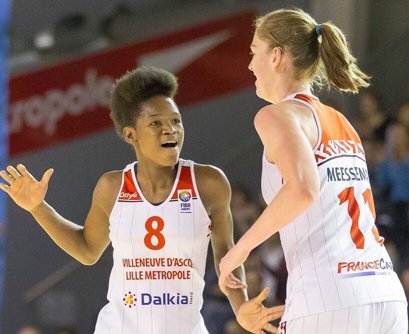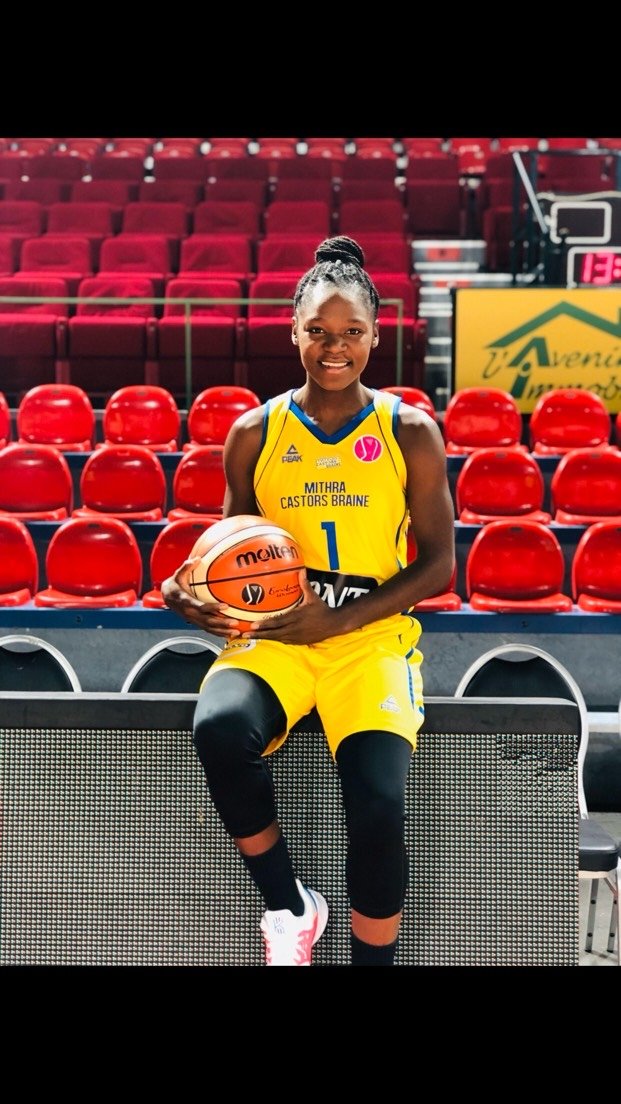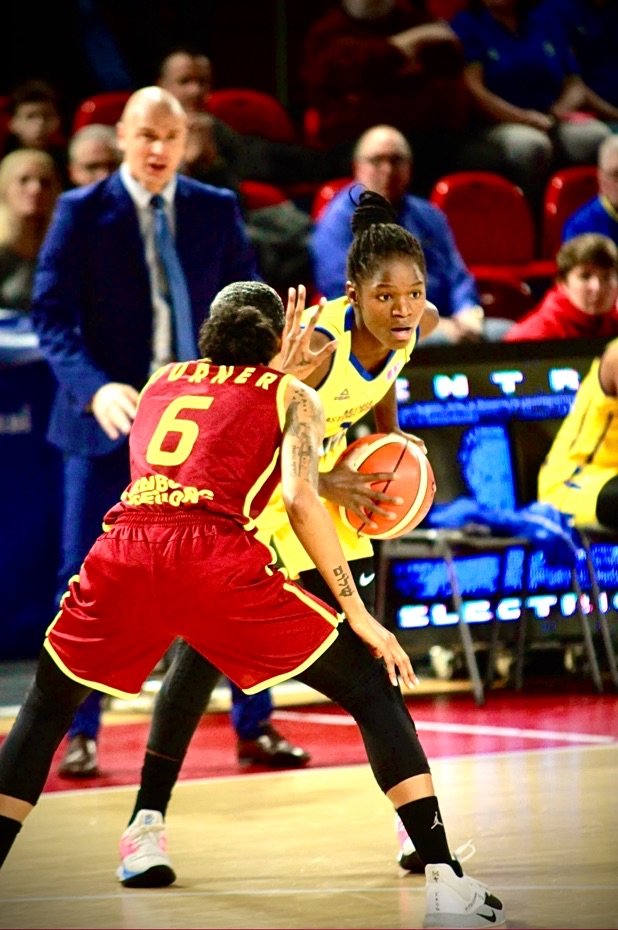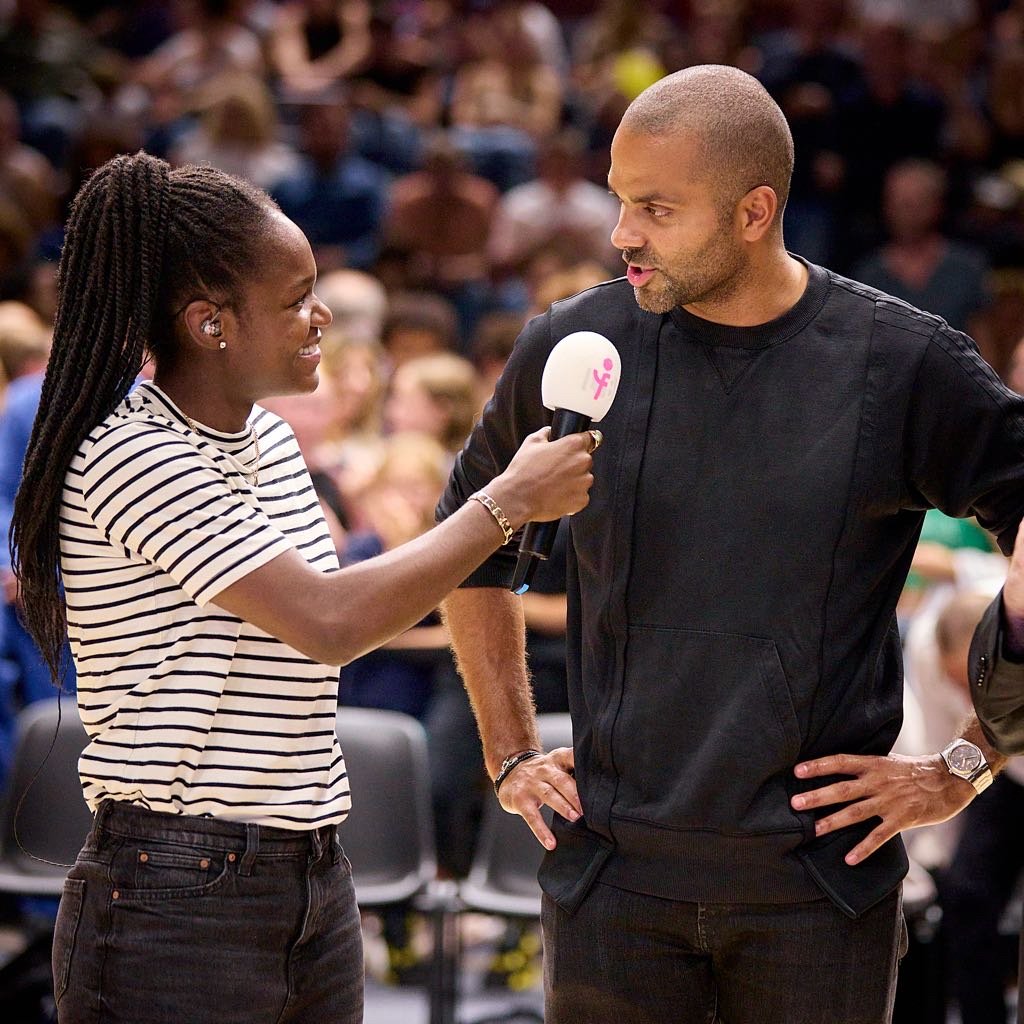🏀0️⃣4️⃣0️⃣ Melissa Diawakana
Photo: Melissa Diawakana.
Meet Melissa Diawakana, a former professional player-turned-skills trainer, graduated professional coach, speaker, and media consultant who spun a passion for basketball into a career and passport to the world.
Born in Kinshasa, Democratic Republic of Congo in 1992, Diawakana arrived in France as a six-year-old without her family to embark on an entirely different life. “I was this little girl, lost in a place where she had no control, where everything was different.” Growing up in the Parisian region, she was very active and at age ten, one of her teachers suggested she try sports. She loved football and originally wanted to play, but one of her friends suggested she do basketball instead because it was an indoor sport, a consideration as during the cold winters. From the moment she got into the gym, she never left, thus began her basketball journey, one that’s taken her across the European continent, as well as to the United States.
Melissa’s Story
“I fell in love with basketball,” Diawakana reminisced.
“It was different at the time because it was a family. It was amateur, not pro, so people help with everything. I was welcome in a place that I've never been before. It was the first time since I left Africa that I felt so much more welcome, so much love. I fell in love with the environment of basketball and the people that I met, which helped me as a young woman.”
One of her coaches served as a mother figure and helped the aspiring basketteuse. “She helped me, she was there for me, she was everything for me and she is the foundation of the person I am today,” Diawakana acknowledged.
“I understood that it could help me as a woman, as a player, but it could give me a real life, it could be a job, I could get money from doing this.”
She gave the game her all and left everything on the court, focused on dribbling the ball. It was an outlet for her emotions, a way to express her true self. She set goals early-on. She excelled, and as she began to play professionally, found basketball was also a passport to see the world.
Diawakana also began to discover U.S. basketball via the NBA. She began to notice people wearing NBA jerseys, red ones with the number 23, yellow ones with the number 24. After researching on the Internet, she understood that the former was the Chicago Bulls’ Michael Jordan while the latter was the Los Angeles Lakers’ Kobe Bryant. “So I started to watch videos of Jordan, I started to watch Kobe.” It was a “wow!” moment as she began to investigate not just the NBA, but the culture around it, too.
The Sports Diplomacy Connection
Diawakana engaged in informal sports diplomacy through her professional career in EuroLeague, communicating, representing, and negotiating international attitudes about France and its basketball culture, but she’s also learned about other places, too, through the game’s ability to foster such citizen-to-citizen exchanges.
Her first experience in the United States, in the mid-2010s, set a baseline for how basketball served as a means to better understand the country, its people, and its sports culture. “I wanted to know so much about the culture,” Diawakana explained, thus when one of the players she competed against in Europe suggested a trip, Diawkana said “oui” and spent one month discovering the United States for herself. From Milwaukee, Wisconsin to Portland, Oregon, San Francisco, California, it was an experience. She returned to the United States for the 2023 NBA Summer League in Las Vegas, Nevada, this time in her capacity as a basketball skills coach and more.
The trips exposed her to so much, most notably the vastness and variations of the country. “We think about the American dream,” she said of the ideas conveyed by watching U.S. basketball, of the players and the lifestyle they broadcast. “I had that vision also.” But once on the ground, she realized that things were quite different, starting with how parts of the United States differed from each other–that it was not one monolith country, culture, or people.
Yet, there were commonalities that threaded their way through her interactions with everyday Americans. Particularly the mentality of progression. “People welcome you,” she said,
“Even if they don't care, they’re still like, ‘this is cool.’ They’re open, you’re free to talk about so many different things. People connect really fast. If you have an idea, they want to hear more, they’re interested in how you want to move forward [in business]. If you want to get an opportunity and you are serious, people will open the door for you, they will try to help you. That was my experience.”
Diawakana was impressed by the ways that “everything is big” in the United States, from the streets to the gyms, which was where she learned a different aspect of U.S. culture: access to opportunity. “In Europe, if you want to go to the gym, you need to ask for access,” she explained. “In the United States, the doors were open, you can practice. If you want to succeed, everything is there for you to try.” She was especially impressed by the ways that school gymnasiums–and gyms more generally–were open for practice morning, noon, and night, unlike back home. “I now understand why [Americans] are so successful [in basketball] because they give players access,” she said. Basketball was also abundant on the streets. “You see people just playing the game on the street with passion and you can see people really have talent.”
Photo: Melissa Diawakana.
Despite the differences, one thing remained constant between her European and U.S. basketball experiences: the code. “Basketball has many codes,” she explained and its own operation.
“If you don’t know about it, you will miss so many things and details that are very important. What’s amazing is the same code that we have when we play pro, we play indoor. Those are totally different outside with different rules, with different respect, you bring your game, not your name”
As a Frenchwoman in the United States, Diawakana also communicated, represented, and negotiated American ideas about France and its basketball. She explained that she was Parisienne, an instant conversation point as many Americans admitted their admiration of the city. On her first trip to the United States, she didn’t get many questions about France. Instead, she was asked about the differences between the European game it’s ami american, from court size to rules. When she returned in Summer 2023, things were different–perhaps because by then, many in the United States had discovered France and its basketball through the year’s Number 1 NBA Draft selection Victor Wembanyama. “It was fun,” Diawakana relayed of the difference she noticed around Summer League.
At 2023 NBA Summer League in Las Vegas. Photo: Melissa Diawakana.
“With some coaches, and I was really surprised, I was asked about a lot more. For example, in the NBA, you don’t have the same position on defense [from the coaches], you can’t really hang out in the paint. You need a certain distance with players, it opens the space which allows them to play one on one. We have different rules in Europe, it makes things a little harder. I was providing more analysis [for U.S. coaches] about the strengths or challenges of the European game in comparison, even though I had a lot of questions about myself.”
Diawakana was also witness to the Wembymania phenomenon. When the San Antonio Spurs played, there were a lot more people in the stands than usual–it was full. “Everybody was there just to watch Victor play,” she said.
But the new attention on the four French rookies (Wembanyama, Bilal Coulibaly, Siddy Cisoko, Rayan Rupert) at Summer League was instrumental for Diawakana. “This influence was just crazy,” she relayed.
“It helped me to introduce myself a little more easily to people, when they knew I came from Europe, even coaches, they were open-minded and asked a lot of questions. It was a totally different vibe.”
Photo: Melissa Diawakana.
Although Diawakana doesn’t consider herself a sports diplomat, she does think of the ways that sport helped her. “Sport saved my life,” she said. “Sport helped me to become the woman that I am today.” She credits basketball and God for helping educate her about life, about many things, including knowledge of different cultures. “That’s the reason why for me, I have a new mission,” Diawakana said.
“I can’t die without giving back everything God, basketball or sport just gave to me. So everything I do today is to try to help whoever I can by telling them that through sport or through whatever you want to do in life, if you get knowledge, set goals and have a vision, you can get so many things that you will not even imagine. So, I don’t know if I consider myself as a sports diplomat, but I try every day to advocate for sport, to help as many people as I can.”
Diawakana interviewing French NBA legend and Naismith Basketball Hall of Famer Tony Parker. Photo: Melissa Diawakana.
Mapping the Connection
From Paris, France to Las Vegas, Nevada
Further Reading/Resources
[E] Interview with the author, December 1, 2023.
[F] “Une draft historique pour Wemby et la France!” HYPE, No 33
[F] “La globetrotteuse Mélissa Diawakana raccroce,” BasketEurope.com, November 20, 2021.
How to Cite This Entry
Krasnoff, Lindsay Sarah. “Voices: Mélissa Diawakana,” FranceAndUS, https://www.franceussports.com/voices/040-melissa-diawakana. (date of consultation).









